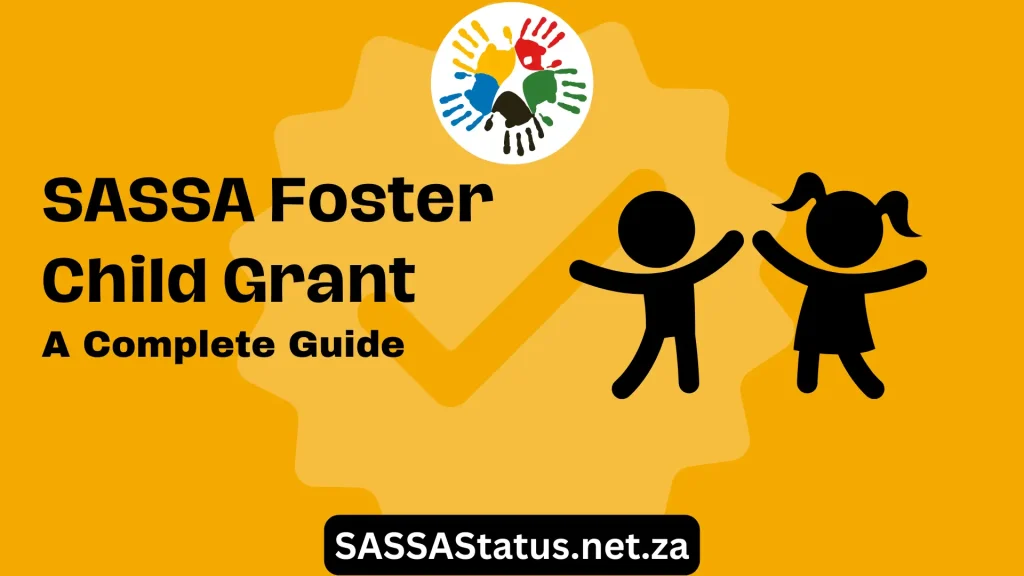SASSA Foster Child Grant – A Complete Guide
The Foster Child Grant helps people who are looking after foster children in South Africa. Foster children are kids who are put under the care of someone by a court because they’ve been orphaned, abandoned, are in danger, abused, or not looked after properly.

If you’re a student in foster care, you could qualify for financial help to pay for college or training programs. There are special grants available just for young people in foster care. Take a look at the information provided below to find out how you can apply for these grants and other types of assistance to support your education career.
How to Qualify for the Foster Child Grant?
Meeting these criteria ensures eligibility for the grant, provides support to caregivers, and ensures the well-being of foster children across the country.

What Is The Grant Amount?
You’ll receive R1,130 per month for each child you’re taking care of through the Foster Child Grant in South Africa. This financial support aims to assist caregivers in meeting the needs of foster children who may have been orphaned, abandoned, at risk, abused, or neglected by providing a monthly stipend.
What Are The Payment Methods?
The South African Social Security Agency (SASSA) offers several payment options:
Cash Payment
You can collect the grant in cash at specific pay points on designated days.
Electronic Deposit
SASSA can deposit the funds directly into your bank or Postbank account. However, it’s important to know that the bank may impose charges for this service.
Institutional Administration
The grant may be administered through an institution, such as a welfare organization.
Collection Assistance
If you’re unable to collect the grant yourself, you have options:
When May Your Grant Be Reviewed?
The grant undergoes review upon the expiration of the court order, typically occurring biennially. Notification for the review process will be provided three months in advance. For recipients receiving funds through banking institutions or a procurator, an annual life certificate must be completed at a SASSA office to verify continued eligibility.
When May Your Grant Be Suspended?
Your grant may be subject to suspension under the following conditions:
Restoration of the Grant
If you feel that your grant has been suspended mistakenly or if you disagree with SASSA’s decision, you have the opportunity to file an appeal with the Ministry of Social Development at the National Department of Social Development within 90 days of the suspension.
Reasons for Lapsing of the Foster Child Grant
Here are the conditions under which the foster child grant may lapse:
- When the child reaches 18 years of age, however, if the child is still pursuing secondary or high school education, the grant will continue until they turn 21. Grant payments will cease once the child completes their education or begins earning an income exceeding the grant amount.
- In the event of the death of the child or the last living foster parent.
- If the child is admitted to a state institution, the grant will expire on the first day of the seventh month following the child’s admission.
- Termination of your foster care for the child.
- If your refugee status, if applicable, is revoked.
- Failure to collect the grant for three consecutive months. It is possible to reapply for grant payments, but if the lapse extends beyond 90 days, a new grant application is required.
- If you are absent from the country for exceeding 90 days without prior notification.
What Documents Are Required for Foster Child Grant Application?
Visit the nearest South African Social Security Agency (SASSA) office with the necessary documentation.
What if Your Application Is Not Approved?
If your application is declined, SASSA will provide written notification detailing the reasons for the decision. Should you wish to contest the outcome, you have the option to lodge an appeal with the Minister of Social Development, based at the national office of the Department of Social Development. This appeal must be initiated within 90 days of receiving notification of the unsuccessful application.
How Long Does it Take?
Processing times for your application may extend up to three months. Upon approval, payments will commence from the date the court assigns the child to your care. This service is provided at no cost to you.
SASSA Foster Child Grant Balance Check
The SASSA balance check service enables individuals to monitor the remaining balance of their grant, facilitating better financial management and informed decision-making regarding grant funds. Upon approval of the foster child grant application and commencement of grant payments, it becomes essential to check the balance through various methods regularly:
SASSA Foster Child Grant Reviews
SASSA conducts regular reviews of the foster child grant, typically coinciding with the expiry of the court order, which occurs every two years. These reviews ensure that the recipient still qualifies based on the means test criteria and that their circumstances have not significantly improved.
Additionally, the review confirms the recipient’s continued existence. It’s essential to keep your application updated with any changes in your child’s circumstances to facilitate this process.
You’ll receive a written notice from SASSA approximately three months before the review or the deadline for submitting your life certificate, which serves as proof of your continued existence. This notice will include information regarding the date and location of the review.
If you receive your grant through a bank, institution, or agent, you must annually submit your life certificate to the SASSA office. However, if you’re unable to do so due to being bedridden, SASSA officials will conduct the review at your home. Once the review is complete, you’ll receive a compliance receipt as confirmation.
Responsibilities of the Beneficiaries
As a SASSA grant recipient, it’s important to fulfill certain obligations:
Conclusion
The Foster Child Grant serves as a vital support system for caregivers of foster children in South Africa, ensuring their well-being and security. By providing financial assistance and guidance through the application process, the grant aims to alleviate the burden on caregivers and promote the welfare of vulnerable children across the nation.
Through adherence to eligibility criteria, diligent application submission, and proactive engagement with the South African Social Security Agency, caregivers can access the necessary resources to fulfill their role effectively. The Foster Child Grant reflects a dedication to social welfare, highlighting the collective responsibility to protect the rights and dignity of every child in South Africa.
Contact SASSA for More Queries
If you’re still confused and have more queries related to your status, then do contact SASSA through verified channels: